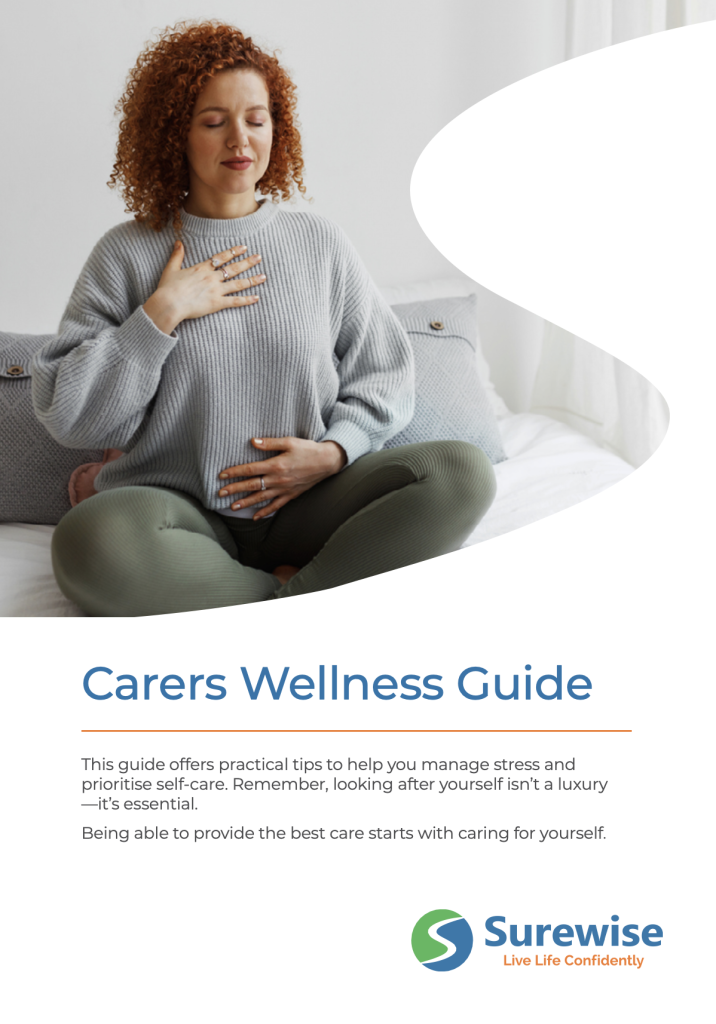Whether you care for a family member or you’re a paid support worker, you’ve probably experienced carer stress from time to time.
Providing personal care and emotional support for someone can be a difficult job. It can be very physically challenging at times, but it can also be hard on your mental health.
We’ve put together a free Carers Wellness Guide, complete with a variety of tips to help you feel calmer and reduce your stress levels. You can download and print this guide, so you’ve always got it on hand when you need to know how to calm down quickly.
In the Carers Wellness Guide, and this article, we’ll look at some of the reasons you might be feeling carer fatigue, how to calm down when you’re feeling anxious, and the next steps you can take if you’re worried about your mental health.
Table of contents
- Carers and Mental Health: What are the Problems?
- Reasons to Look After Your Mental Health
- Noticing The Signs of Stress
- How to Calm Down When You’re stressed
- Carers and Mental Health Support
- How to Avoid Carer Fatigue
1. Carers and Mental Health: What are the Problems?
As a carer, you probably already know why you feel stressed. Whether you care for a family member or a paying client, you spend a lot of time putting their needs ahead of your own.
You might find that you neglect some of your own needs, such as:
- Eating healthily
- Drinking enough water
- Getting a good night’s sleep
- Making and attending medical appointments
- Taking time for yourself
- Spending time with friends and family
We all need to do these things regularly so that we stay healthy – and that’s still true for carers. Neglecting your own needs can affect your mental health badly.
In addition to this, you might have other concerns. Maybe you’re worried about money, or grieving the relationship you used to have with the person you support. You might be anxious about how you will cope in the future – especially if your loved one has a progressive condition like dementia.

Carer stresses like this can build up over time – and if you feel low or worried, you’re not alone. More than three-quarters of carers say that they feel stressed or anxious. Others feel depressed, lonely, or say that they live with a sense of dread.
You might feel hopeless, irritable, or like you can’t concentrate on anything. Maybe small setbacks, like breaking a glass, upset you more than they usually would. Carer fatigue might also mean that you have less patience with the person you support. These can all be signs of depression, anxiety, or stress.
2. Reasons to Look After Your Mental Health
It might feel difficult to find the time to look after yourself. But when you skip meals, sleep poorly, or avoid seeing the doctor, you put yourself at risk of getting ill.
Looking after your mental health and avoiding too much carer stress can help to keep you healthy. Your mental health is just as important as your physical health – and they can be closely linked.
Everyone feels stress and anxiety from time to time, and lots of people also have periods of low mood or depression. In fact, one in four of us will experience a mental health problem each year.
But when stress, anxiety, or depression lasts for a long time, you might also experience physical symptoms, such as:
- Gaining or losing weight
- Disturbed sleep, or feeling very tired
- Digestive problems such as indigestion, nausea, constipation, or diarrhoea
- Feeling dizzy, faint, or breathless
- Chest pain, headaches, or other unexplained pain
- Itchiness or unexplained rashes
- Low libido
- Changes to your menstrual cycle
- Getting coughs, colds, and infections regularly
Breathlessness and chest pain can be caused by stress and anxiety, but they can also be signs of serious health concerns. If you are struggling to breathe or feel chest pain, call 999 and ask for help.
Long-term stress can also lead to high blood pressure, which puts you at a higher risk of stroke, heart attack, kidney problems, and sight loss. And, if you have diabetes, stress can raise your blood sugar, increasing your risk of complications.
You need to look after your mental health for your own benefit. But if you support another person, taking care of your mental health is important for them too. After all, if you’re unwell, you can’t continue to care for them.
3. Noticing the Signs of Stress
We’ve talked about some of the long-term physical symptoms of carer stress, but how do you notice when it’s creeping up on you?
You might be aware of panicky, anxious, or angry thoughts. Maybe you can only focus on the thing that worries you, even when you try to distract yourself.
Everyone experiences stress and anxiety differently, but you might notice some of the following sensations coming on suddenly:
- Having a sense of dread, like something very bad is going to happen
- Your heart beating very quickly
- Breathing quickly, or feeling breathless
- Nausea or the need to go to the toilet
- Being unable to sit still
- Dizziness
- Sweating
- Feeling very hot or very cold, regardless of the temperature around you
If you notice these feelings, you could be on the verge of a panic attack.

4. How to Calm Down When You’re Stressed
If you can tell that a panic attack is coming on, or you feel that anxiety or anger are building up, you need to know how to calm down quickly.
The advice here can help you when you’re feeling stressed. But if you don’t feel safe, or don’t feel that you can keep others safe, contact your GP or call 999 in an emergency.
Whether your anxieties are due to carer stress, or other worries in your life, there are some techniques that can help to mitigate the feelings of stress and panic.
These methods are designed to distract you from your anxiety, and can help to regulate your breathing and heart rate. Some of these techniques involve breathing techniques, focusing on your body, and massaging your vagus nerve – one of the main nerves that links your body and brain.
How to calm down when you are panicking:
- The neck stroke: Massage your vagus nerve by gentle stroking your fingers down the ridge of muscle that runs from your ear to your collarbone.
- The cymba swizzle: Place your fingertip in the cymba concha, at the top part of your ear. Move it first in one direction, then the other, to massage your vagus nerve.
- Grounding yourself: Move past feelings of panic by focusing on the sensations your body is feeling. You can do this by holding an object, running your hands under water, or just focusing on one particular body part and its sensations.
- Hand breathing: As you slowly breathe in and out, move your thumb up and down your other fingers. This can help regulate your breathing.
- The physiological sigh: Breathe in, then take another, smaller inhale. Then breathe out slowly, to help regulate your breathing.
- Box breathing (or 4-4-4-4 breathing): Breathe in, hold the breath, breathe out, and hold the breath, while counting to four each time. This yoga technique helps distract you by counting, and also regulates breathing.
- Humming (or bee breathing): Whether you choose a favourite tune to hum, or simply hum one note, humming can encourage relaxed breathing.
- Body scanning (or progressive muscle relaxation): Focus on each part of your body, relaxing it in turn.
- Alternate nostril breathing (or nadi shodhana): Close one nostril, and breathe through the other, then alternate. This yoga breathing technique can lower your heart rate and blood pressure.
- Belly breathing (or diaphragmatic breathing or abdominal breathing): Place one hand on your belly, and feel it move as you breathe, while your chest remains still. This technique strengthens your diaphragm in the long-term, and can also help regulate your breathing quickly.
For more in-depth descriptions of how to calm down when you’re stressed, download the Carers Wellness Guide.
5. Carers and Mental Health Support
If you’re feeling stressed or burned out, you may need some extra support.
Think about these questions:
- Do you feel tired or exhausted all the time?
- Are you avoiding spending time with family or friends?
- Have you lost interest in hobbies that you used to enjoy?
- Do you struggle to concentrate on things?
- Do you regularly feel irritable, tearful, helpless, or panicked?
If you’ve answered yes to any of these questions, you might be struggling with anxiety, depression, or carer burnout.
As a carer, you might feel that you have to “power through” when you’re struggling with your mental health. You might not feel able to talk to friends or relatives, especially if you care for a family member.
But help is available.
Whether you’re a professional care worker or support a family member or friend, you can talk to your GP if you’re struggling. They may be able to help by:
- Signing you off work for a while
- Prescribing medication to help improve your mood
- Referring you to a counsellor
You can also contact private counsellors directly, or contact the Samaritans on 116 123 or [email protected].
If you don’t feel that you can keep yourself or others safe, contact your GP or, in an emergency, call 999 and ask for help.
Support for family carers
If you care for a relative or friend, you could ask another family member if they can help for a while.
Maybe someone could help for an hour or so at a time, so that you’re able to go to a doctor’s appointment or do some shopping. Alternatively, a family member or friend might be able to take longer shifts supporting your loved one, so that you can have a holiday or more time to yourself.
You might also be able to get some support from your local council. They may be able to:
- Signpost you towards respite care options
- Advise about training courses that can help you care for your family member or friend
- Help you apply for any benefits that you’re entitled to
To access support, you’ll need to contact your local council and request a carer’s assessment.
Support for professional care workers
As a professional care worker, you might be a personal assistant, work in a residential care facility, or be employed by a care agency.
You should talk to your employer about your concerns. You may need to take some time away from work, or perhaps your employer could move you to a different role for a short while.
If you’re a paid carer and worried about money, The Care Workers Charity may be able to help. They offer hardship grants to carers in certain circumstances. Alternatively, if you’re concerned about debt, StepChange can offer advice and support.
6. How to Avoid Carer Fatigue
There isn’t always an easy way to avoid carers burnout, but you might need a short break from your caring responsibilities, someone to talk to, or even medication to help your mental health.
If you feel guilty about taking this time for yourself, remember that you need to take care of yourself so that you can be a good carer.
Five ways to avoid carer fatigue:
- Eat healthily and drink enough water. It’s simple advice, but your body needs this fuel to function. If you’re not getting good nutrition, you’re more likely to feel low, worried, or irritable.
- Get enough sleep. If the person you support needs care during the night, consider whether you should hire another carer to help them while you sleep. If you’re a paid carer, you should never be asked to work all day and night.
- Take time for yourself. It’s not always easy to take time away from the person you support. Whether you need a few hours to go to medical appointments, full days for work, or longer so that you can have a holiday, you may be able to find respite care. Even if you stay in the house with your loved one, try to make time to do things that you enjoy, such as reading a book, watching a favourite TV show, or enjoying a long bath.
- Socialise. Being a carer can be an isolating role at times. Lots of carers report that they feel lonely, especially if they care for a family member. But even professional care workers can feel isolated – especially if they work as a personal assistant or provide domiciliary care and don’t often see colleagues. Try to spend time with family and friends outside of your caring role, and talk to them about how you’re feeling.
- Take care of your own health. If you notice worrying symptoms, whether physical or mental, make an appointment with your GP or seek emergency medical attention. Follow the instructions of your healthcare team – even if this means spending time away from the person you support.
And if you feel that you’re starting to panic, follow the techniques in the Carers Wellness Guide to help yourself calm down.









